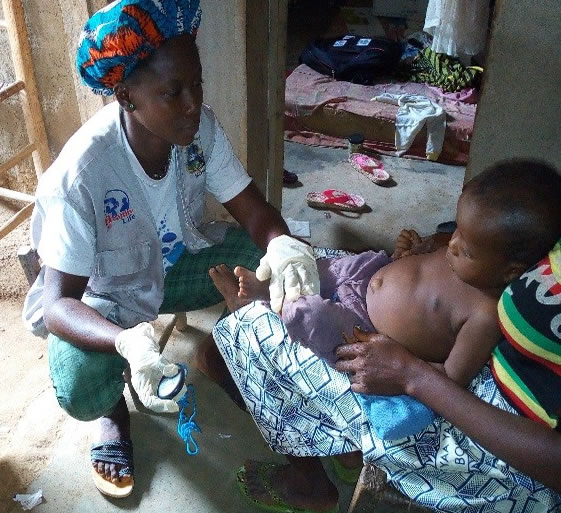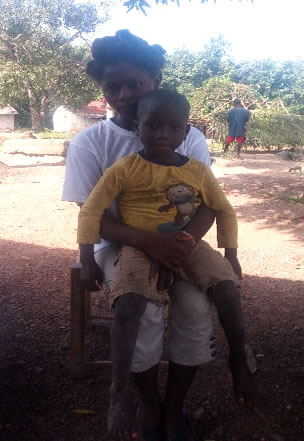
Weedor G. Sando, a trained CHA tests a child whom she suspects has malaria in Gbeyata Village, Bong County
Four-year-old Samuel was burning up. Fever is a sign of malaria, which can be dangerous in children younger than 5. But Samuel’s home in Balama Town, Liberia, was a two-hour walk from the nearest health facility.
Luckily, Balama Town now has Albert, a community health assistant (CHA), to whom Samuel’s mother Helen took the child. After a quick test, Albert told Helen that the boy had malaria and gave her two drugs: artemisinin-based combination therapy (ACT) and paracetamol. Two days later, Samuel was back playing with his friends.
Samuel’s recovery was thanks to the U.S. President’s Malaria Initiative-supported project: USAID Partnership to Improve Community Health Systems and Services (PACS). Since 2016, PACS has trained, deployed and equipped more than 240 CHAs like Albert in Liberia’s north-central Bong County.
CHAs visit each household at least once a month to identify children who have diarrhea, pneumonia or malaria—any of which can be life-threatening for children under 5. Caring for all three of these diseases at once is an approach called integrated community case management (iCCM).
In addition to training, CHAs need supplies to carry out iCCM. Children who have diarrhea need oral rehydration salt and zinc, while children who have pneumonia need amoxicillin and pediatric paracetamol. As was the case with Samuel, children who have malaria are diagnosed with rapid diagnostic tests (RDTs) and given ACT.

Helen said that the CHA program has relieved her worry and stress. She hopes that number of drugs sent to the CHAs continues to increase so that families don’t have to revert to travelling to a clinic because supplies run out.
Helen and Samuel, who received treatment for malaria with PACS support.
Before the CHAs were trained, Helen and Samuel had to walk for two hours to get to a health facility. There they were given a prescription and sent to a pharmacy, though they did not have had enough money to buy even a single tablet of the needed drugs.
“It was very hard for us,” said Helen. “With this we would be forced to continue giving the child country herbs at home and sometimes the child would either die or recover by the grace of God.”
One of the other 208 communities in Bong County benefiting from PACS is Gbeyata. Between April and June 2017, Gbeyata recorded 13 malaria cases, all of which were diagnosed positive using RDTs and successfully treated with ACTs. The children made a full recovery due to the improved availability of RDTs and ACTs for early identification and effective management of malaria by CHAs.
“The CHAs are doing well for us, because there has been no jerking sickness in our town since they started their work and all the children who have hot skin [fever] are treated by them.”
– Mother in Gbeyata
During the same period last year, however, RDTs and ACT ran out, so the CHAs in Gbeyata could not confirm malaria cases and had to refer all suspected cases to the nearest health facility.
“With PACS, the amount of drugs supplied to the community has improved greatly,” said a representative of the community health committee. “The CHAs are very proactive and show all drugs to community members when they receive them.” She added, “Gbeyata can now boast of better health care to the community dwellers, especially children.”
